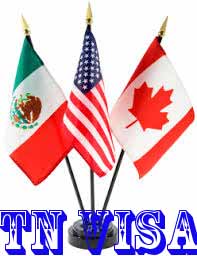What is a TN Visas?
The TN visa was created as a result of the implementation of the North American Free Trade Agreement (NAFTA) in 1998. It allows eligible Canadian and Mexican citizens to work in the United States under Nonimmigrant Status. Once granted a TN visa is valid for up to 3 years and can be renewed indefinitely as long as the applicant remains with the same employer.
How to qualify for a TN visa?
There are certain conditions that a potential applicant must meet in order to receive TN status in the U.S. The relevant conditions are:
- Must be a Canadian or Mexican citizen (permanent residents may not apply)
- Must be in a profession listed under the NAFTA regulations (taken from Appendix 1603.D.1 of NAFTA)
- Must be filling a position in the United States which requires a NAFTA professional
- Must have a prearranged full or part-time position with a single U.S. employer
- Must have achieved the minimum academic qualifications for the profession (listed in Appendix 1603.D.1)
There are approximately 60 eligible professions that can qualify for a TN visa. Most of these positions require at least a baccalaureate degree. Other professions have minimum experience requirements as well. For example, let’s examine the profession of Computer Systems Analyst.
A Computer Systems Analyst must possess one of the following requirements: a Baccalaureate or Licenciatura Degree; a Post-Secondary Diploma (credential issued for a minimum 2 year program by an accredited academic institution in Canada or the U.S.); or a Post-Secondary Certificate (certificate issued for a minimum 2 year program at an academic institution recognized by the federal or state government of Mexico) plus 3 years’ experience. As you can see, there is some flexibility afforded in meeting the minimum academic qualifications for this position.
Positions under Heightened Scrutiny
It seems to be easier to obtain a TN visa depending on the profession. This comes down to the job description and how much flexibility is granted to particular duties of the profession. For example, applicants applying under the Computer Systems Analyst profession will be more carefully processed than other professions due to the fact that the lines may be blurry between duties carried out by an Analyst as opposed to duties carried out by a Programmer. The same can be said for any professions that involve consulting. The immigration officer will need to carefully verify that a consultant is indeed acting in the capacity of a consultant and not a manager.
Renewal of TN Visas
After successfully obtaining TN status, visa holders can renew their applications when their initial period is about to expire. This can be done by mailing in a renewal if the applicant is still in the United States, or it can be done by returning to a border or port of entry and presenting a new application.
Recently there have been more incidents of applicants being refused renewals for the TN visa. While on paper you should be able to renew indefinitely as long as you continue to work for the same employer, in actuality the officer is not required to renew TN status. It is up to the reviewing officer’s discretion.
There have also been reported instances of U.S. Border Service officers applying more stringent rules on TN visa holders who wish to renew. According to an open letter submitted to Citizenship and Immigration Canada from Peter Zurawel, the Colorado Director of IBI Group, many of his employees on TN visas were told to also apply for an L-1 visa.
What is an L-1 Visa?
There are 2 types of L-1 Visa: L-1 A which is for executives and managers, and L-1 B which is for workers with specialized knowledge. Depending on their profession, TN visa applicants may also be requested to apply for a corresponding L-1 visa. Like the TN Visa, the L-1 is a non-immigrant visa most commonly made available to employees of international companies with offices in the U.S.
To obtain an L-1 Visa, applicants may be required to apply for either: a Regular L-1, or a Blanket L-1.
To apply for a Regular L-1 Visa, the international company that employs the applicant must file a petition with the U.S. Citizenship & Immigration Services (USCIS) for each employee wishing to enter the U.S. for work. Each application is evaluated separately.
To apply for a Blanket L-1 Visa, the international company is already registered with the USCIS and has been approved for Intracompany Transferee visas. In this case, an employee can simply file a copy of the company’s blanket petition along with documentation. In this way the blanket petition covers all employees of the company wishing to enter the U.S.
TN Visas: What Documentation is Necessary to Apply?
In order to increase your chances of success in obtaining a TN Visa, it is advisable to gather the documentation that helps to validate your background. There are cases of applicants succeeding even though they provided minimal documentation. Nonetheless, it is always better to be well prepared, particularly if the officer decides to be extremely thorough in his or her assessment.
Below are some examples of documentation that could help you obtain a TN Visa at the U.S. border or port of entry:
- Proof of Qualifications: As mentioned earlier, each profession has strict minimum requirements in terms of relevant education, training, licensing, certification, and experience. It is in the applicant’s best interest to bring documentary proof of this. Remember, when it comes to presenting qualifications from Canada or Mexico, you should have them assessed by a qualified U.S. credentials evaluator or academic, as there may be differences in equivalencies. If you are presenting proof of qualifications in a language other than English, these documents will need to have been officially translated so that the officer may read them.
- Letter of Employment: The company you are working for should furnish you with an employment letter on company letterhead. It is also better if this employment letter is signed and dated to make it more official. The letter should confirm that your position is temporary and that you will be a direct employee of the company. A crucial detail to be included in the letter of employment is the duties of your position. If the duties do not correspond with the information about your profession outlined in Appendix 1603.D.1, then you may not be able to qualify for a TN Visa. It is also important for the letter to mention your salary.
- Information about the Company: It is important that the officer evaluating your application has access to proper details about the company you are employed with. This could be a general information sheet about the company’s location, objectives, revenue, size, etc.
- Resume: It doesn’t hurt to have an up to date resume available which can quickly allow the officer to evaluate your relevant educational and work experience. A professional resume helps make a good impression and really helps to summarize what you are capable of doing.
These are just some of the documents that can help you successfully apply for a TN Visa. A professional application package would contain all the information necessary to prove your background, credentials, and reasons for requesting to work in the U.S.
Contact Akrami and Associates
If you are adequately prepared to apply for a TN Visa, you will have a much better chance of receiving permission from the U.S. officer so that you can enter the country and start working. For those considering going to the U.S. to work as a professional under the NAFTA agreement, make sure that you prepare the best possible application. Contact our legal team of Canadian and U.S. immigration lawyers today at 416-477-2545. Our staff can help you enter the next phase in your professional career by using our experience and knowledge to benefit you.

